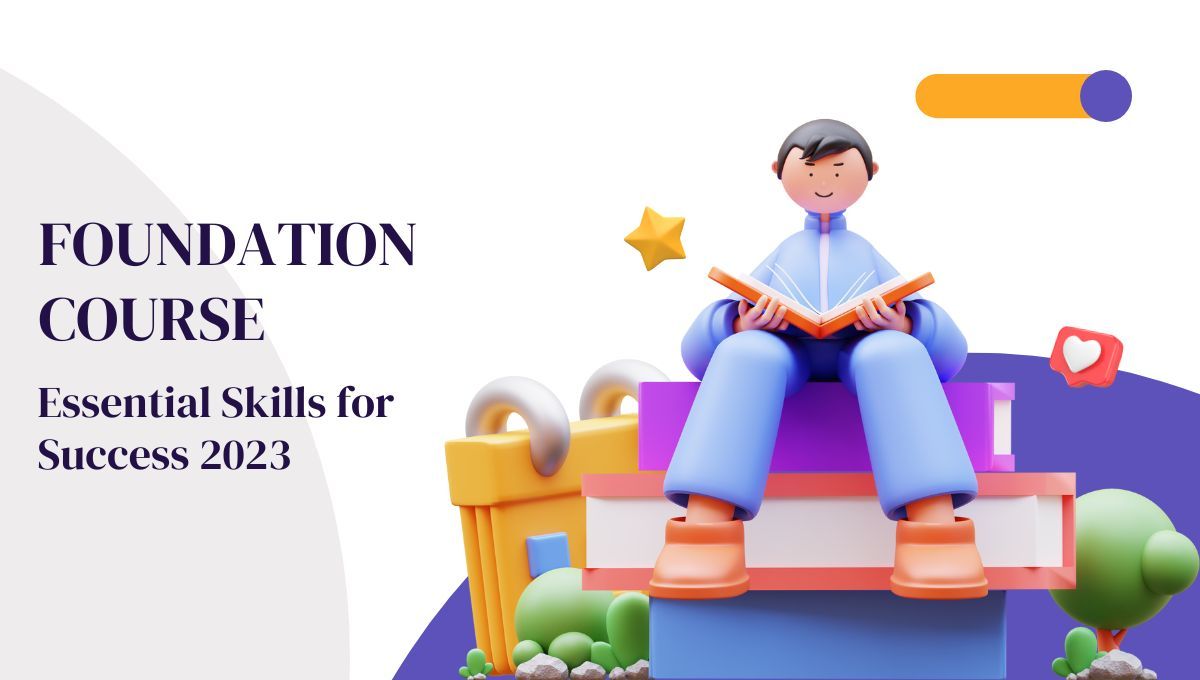Introduction To Foundation Course
A one- or two-year course prepares school graduates for a bachelor’s degree in art, design, or architecture. The training is mostly practical, with more art and design history. Foundation courses provide students with the fundamentals they need for a degree. Color, shape, two- and three-dimensional space and material experimentation are included.
Art and design history, critical thinking, and problem-solving will be taught. They accept students from many academic backgrounds and don’t need art or design expertise. Foundation courses are fantastic preparation for careers in art, design, and architecture. It may improve your abilities, knowledge, and confidence and offer you a taste of college.
What is Foundation Course?
Courses, sometimes called preparation courses or bridge programs, prepare students for higher education or specialized areas of study. It fills educational gaps and prepares students for further education. This Course teaches students the core ideas, principles, and skills needed to thrive in their field.
It Covers math, physics, humanities, and language abilities to prepare students for their chosen academic or professional fields. This Course leads to undergraduate and postgraduate programs in universities, colleges, and educational institutions.
What is in Foundation Course?
Foundation courses differ by institution and topic of study, but here are some common elements:
- Mathematics: These courses need math. Algebra, calculus, geometry, and statistics teach pupils arithmetic and problem-solving.
- Sciences: Courses include physics, chemistry, and biology. These courses teach scientific ideas, experimental procedures, and natural science topics.
- English Language Skills: In Academic Year requires strong English language abilities. Foundation classes teach English reading, writing, listening, and speaking. Grammar, vocabulary, comprehension, and communication activities are possible.
- Humanities and Social Sciences: These Courses may include history, geography, economics, psychology, and sociology. These fields develop critical thinking and analytical abilities through broadening human society, culture, and behavior.
- Study Skills: Foundation classes generally educate students on study skills, time management, note-taking, and research. Higher education achievement requires certain talents.
- Computer Literacy: Today’s foundation courses may incorporate computer literacy and basic programming. Students may study computer systems, software, and internet navigation.
- Academic Writing: Courses teach students essay structure, citation, and writing competency. Higher education requires these qualities.
- Critical Thinking: Foundation classes teach critical thinking, information analysis, and logical reasoning. This helps pupils solve complicated issues and argue well.
- Practical Skills: Some foundation courses teach laboratory, artistic, or business skills. These hands-on activities prepare students for their fields.
There is Some important Element in Foundation Course.
Why We Need Foundation Course?
Benefit
Courses provide several advantages
- Cover Educational Gap: These courses fill educational gaps. They serve those who have taken a hiatus from school or lack the requirements for straight admission into their selected sector.
- Foundation In Key Subject: These courses provide students with important disciplines pertinent to their field of study. These courses provide fundamental math, science, humanities, and language abilities.
- Skill Development: These courses teach topic matter and necessary skills. Critical thinking, problem solving, research, and study abilities may improve. These skills are necessary for success in higher education and many careers.
- Increase Confidence: Foundation courses boost confidence. They master the fundamentals of their area, enabling them to tackle increasingly difficult topics
- Easy Transition to College: Foundation courses lead to college. Foundation courses generally satisfy undergraduate and postgraduate admission criteria. Students may build on their core knowledge and easily transfer it into their degree programs.
- Explore Academic Year: Courses let students explore their academic interests before choosing a major. They may explore several fields to make informed academic and professional choices.
- Preparation For Foreign Students: Foundation courses help foreign students adjust to new educational systems, languages, and cultures. These courses provide linguistic assistance and academic preparation to help students succeed in their degrees.
- Employability: Foundation courses provide students with the skills employers want. The training taught topic knowledge, critical thinking, and good communication, which are crucial work skills.
Types Of Foundation Course
- Academic Courses: These classes aim to provide students with the academic basis they need to succeed in higher education. Common subjects covered include critical thinking, research methodologies, and academic writing.
- English Language Courses: These foundational English language courses are intended to assist students raise their English language proficiency to the level needed for collegiate studies. They often touch on subjects like grammar, vocabulary, and reading comprehension.
- Specific Subject Courses: These courses provide a topic basis. They cover business, engineering, and the arts.
- International Course: These courses are recommended for international students applying to English-speaking Universities or Countries.They often cover subjects including academic proficiency, cultural awareness, and English language proficiency.
To Know more about Foundation courses Click Here.
Conclusion
Foundation courses might be an excellent opportunity to be ready for college. They may assist you in acquiring the academic abilities required for success, filling in any knowledge gaps, and experiencing university life.
I advise anybody thinking about enrolling in a foundation course to conduct their homework and pick the course that is best for them. Foundation Course Can Help You to increase your Learning Capacity and Develop your academic year, research method. And it can help to you get a chance for admission.
